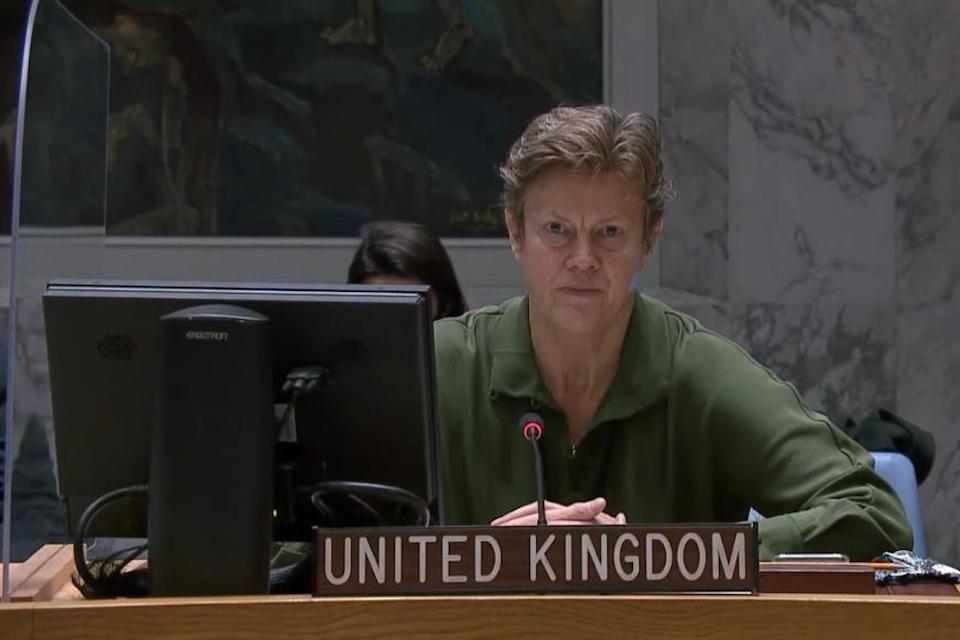The value of women’s economic inclusion for maintaining peace
Statement by Ambassador Barbara Woodward at the UN Security Council open debate on gender equality today for a sustainable tomorrow

Thank you, Madam President, and welcome to the Council.
Thank you for chairing this debate. Our briefers and speakers so far have eloquently highlighted the importance and the value of women’s economic inclusion for maintaining peace, and stabilising peace in post-conflict settings.
And, this debate is timely as we grapple with the challenge of recovering globally from the Covid-19 pandemic, whose economic impacts fell disproportionately on women and girls –- and risk, without effective intervention, having a long-term effect.
Madam President, our theme today is partnerships – may I highlight three?
First, as Ms Coulibaly highlighted, the critical role of funding:
The UK government is committed to working with partner governments, multilaterals and the private sector to support women in fragile economies to play an equal role in the economy, to access the benefits of trade globally, and to establish economic partnerships as levers for equality.
For example, in Jordan, where women face the compound effects of conflict, displacement, and the impacts of COVID-19, the UK development programmes provide cash transfers to refugees and to at-risk Jordanian women.
More generally, the UK and our G7 partners are leading the way in mobilising public and private investments to advance gender equality and address persistent gaps in women’s economic opportunities, such as access to digital and financial assets.
Through the 2X Financing for Women Challenge, launched during the UK’s G7 Presidency last year, British Investment International and our partners committed to investing over $15 billion over the 2021-22 period, to advance this agenda in developing countries.
And, this work includes supporting flexible working practices, access to leadership opportunities, financing, and affordable products and services. But in a context where only 25% of women in fragile states have bank accounts, we also need to consider innovative interventions like microcredit loans.
Second, with partners, we’re partnering to promote policies designed to promote women’s inclusion and full and meaningful economic participation. We particularly welcome the theme of Gender and Climate at this year’s CSW, which is an opportunity to highlight the role women can play in advancing the climate change agenda after COP in Glasgow and ahead of COP in Egypt. In addition, the UK has committed, with G7 partners, to new targets to get 40 million more girls in school, and 20 million more girls reading by 2026.
Overall, our vision is that all girls should get 12 years of quality education.
Thirdly, we seek to strengthen partnerships here in the UN and here in the Security Council in support of women’s economic, social and political inclusion – drawing on the experiences that we have heard about. And, I join others in highlighting the particular reversals that women of Afghanistan have suffered since August.
As we discuss the renewal of the UNAMA Mandate, we will prioritise returning Afghan women to their full meaningful inclusion in Afghanistan’s economy and society.
Madam President,
The UK welcomes today’s debate, which has underlined why economic inclusion should be an integral part of a holistic approach to women, peace and security.
But, I cannot finish without stating the obvious. Economic inclusion is no protection against bullets and bombs. This has been made horribly clear over the last 13 days. And just yesterday, we witnessed Russian shelling kill a Ukrainian mother and her two children as they sought to evacuate the city of Irpin.
They were not the first casualties – tragically, they will not be the last. Men, women, children – Russian as well as Ukrainian – will continue to suffer until Russia ends this brutal and unprovoked war.
Thank you for convening today’s debate.